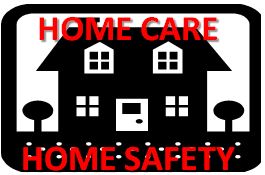
As follow up to our first post on senior home safety, we will now delver further in to caregivers’ home health. When an elder relies on a caregiver (whether a family member or a home health aide), it is vital that the caregiver stay healthy to be able to continue caregiving. Unfortunately the demands of caregiving can be detrimental to health and make caregivers injury-prone.
Here are some statistics on senior caregivers’ health and safety:
One study of stroke caregivers showed that those with a high level of burden were more likely to experience an injury and the vast majority of injured caregivers said it affected their ability to provide care. (The prevalence of injury for stroke caregivers and associated risk factors. Haye, Chapman, Young and Rittman. Kansas City VA Medical Center, 2009.)
Professional caregivers also face a higher risk of on-the-job injury than other professions and settings. Even compared to aides in hospital/institutional settings, home caregivers experience more work-related injuries. Some of this is due to traffic accidents, since caregivers may have to travel between clients and sometimes transport clients or run errands, but the rates remain higher than other jobs even without the traffic accident injuries.
The rate of overexertion injuries in home healthcare is 183 in 10,000 workers. (Bureau of Labor Statistics)
What precautions can you take as a senior caregiver to stay healthy and safe?
- Get proper training. Caregivers need an understanding of body mechanics and lifting. They need to know how to properly transfer a caree or assist with ambulation. They need to understand what to do in case of a fall. Professional caregivers will typically receive some of this training in their original certification, but it is important to get refreshers. Family caregivers may want to take a home health aide or related course to get training on these issues, or work with a professional caregiver on some of their loved one’s physical needs.
- Be particularly cautious regarding lifting. Overexertion injuries are most common, with lifting often being involved. Proper lifting technique and use of body mechanics can reduce the risk.
- Be properly equipped. Having the home set up safely and having the proper assistive devices is not only good for the senior, but helps ensure the caregiver’s safety.
- Do not hire professional caregivers who are not part of a home health agency (and make sure you understand the agency’s requirements/standards regarding insurance and training). You do not want to put your situation at risk with someone who has no worker’s compensation or liability insurance, and has not received training and support on key safety issues.
- Be honest, a. with the home health company you hire, about your loved one’s needs and/or any behavioral issues and b. with yourself if you are the primary caregiver, about when you might need help.
- Practice good health habits. This can be especially difficult when caregiving for a loved one, but it is important to get sufficient rest, eat a healthy diet and exercise. Strengthening and flexibility exercises can help you avoid injury. Consider respite care in order to ensure you can get sufficient rest and take care of your own health.
What are some of the things EasyLiving does to help ensure its senior caregivers’ home health and safety?
We provide safety training during orientation and in our ongoing training program. This includes accident causes and prevention (health care safety) and combative patient training. We provide the training in-house and pay our caregivers to attend. Right now, we’re offering our caregivers a special bonus for coming in to the office to watch our updated safety videos. Caregivers get their normal training pay rate, plus a $25 bonus for completing the training.
We have a Safety Officer designated to provide this training and safety coaching to our team. She teaches on items such as body mechanics (helping the client ambulate, transfer, proper body positioning for lifting) and behavioral training (dealing with combative clients, tips for anticipating potential physical contact and avoiding being kicked/hit, communicating/being prepared). She has over 20 years of field experience as a caregiver and has also worked as an instructor at Florida Medical Prep, a training academy for certified nursing assistants.
We offer our caregivers the opportunity to sign up for a supplemental insurance policy, to encourage them to practice a healthy lifestyle. It also gives them some peace of mind by covering non-job related injuries.
We have well-defined procedures for handling clients’ physical needs, which we review with caregivers at orientation and training, as well as when we make on-site visits. This ensures all caregivers understand the standard ways to safely handle clients’ needs.
We offer free on-site safety assessments, where we review safe care practices in the home and help train caregiver and client on the safest ways to work together in the home. If we spot concerns about the care situation or home safety, we can offer suggestions to remedy those.
If you’re a family caregiver or senior who needs help with safety around the home or assistance with caregiving, our Senior Care Consultant is always happy to talk to you about your concerns and needs. You can click below or call 727-448-0900. If you’re a professional caregiver/home health aide who would like to work for a great company that values your safety and well-being, check out our Home Health Careers page.








